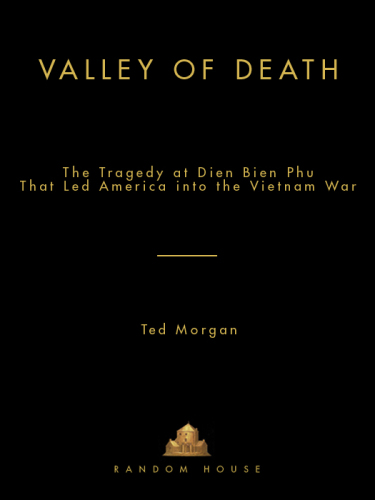
Valley of Death
The Tragedy at Dien Bien Phu That Led America into the Vietnam War
کتاب های مرتبط
- اطلاعات
- نقد و بررسی
- دیدگاه کاربران
نقد و بررسی

Starred review from December 14, 2009
Pulitzer-winning journalist Morgan (Reds
) synergizes a comprehensive spectrum of overlooked sources in this magisterial analysis of the 1954 French defeat at Dien Bien Phu and its consequences. The battle ended French colonial rule in Indochina and set the stage for American involvement in Vietnam, as unwanted initially as it was tragic in the end. The French, in November 1953, decided to establish a base in the remote valley of Dien Bien Phu. They were convinced the garrison could be supplied and supported by air, and Vietminh reaction thwarted by the roadless mountains and impenetrable jungles. Both assumptions were mistaken. Morgan, himself a veteran of the French army, eloquently describes the envelopment, the strangling, and the crushing of the French garrison by “a people's army of Vietnamese peasants” in the face of no less determined defenders. Reframing the battle, often viewed as a French folly, Morgan calls Dien Bien Phu “one of the great epics of military endurance” by both sides. His book is a fitting tribute to the men who wrote that epic. 16 pages of b&w photos, 2 maps.

Starred review from December 15, 2009
A Pulitzer Prize–winning historian observes that had Franklin Roosevelt served another few terms, Americans might never have had fought and died in Vietnam.
Having fought in Algeria in the French Army, Morgan (My Battle of Algiers, 2006, etc.) understands military culture and lost causes. The great lost cause in question is French control of Indochina after World War II, a conflict that witnessed a curious accommodation. Under Japanese command, French soldiers and colonialists continued to administer the territory throughout much of the war, even as Communist fighters under Ho Chi Minh and other leaders waged a steady campaign of national liberation. Ho saw no problem in the French defeat by Japan, reckoning that it exposed the faraway European power as a paper tiger. Moreover, he served as a good ally of the Allies throughout the years of the war, in at least one instance rescuing a downed American flyer but being rebuffed by American officials for his troubles. Meanwhile, writes Morgan,"FDR felt strongly that colonialism had no place in the postwar world," grimly noting that Americans were dying in the Pacific Theatre precisely because of what he called"the short-sighted greed of the French and the British and the Dutch." The French refusal to give up Indochina led to a grinding war of suppression that a post-FDR America supported to the tune of millions of dollars, a war against China and the Soviet Union by proxy. It also led to the legendary defeat at Dien Bien Phu, when waves of Vietminh fighters surrounded a French army—"not a single Viet ran, they all had to be killed," said one exhausted French soldier—and, over the course of weeks, bled it dry. The author writes of the battle in specific detail rivaling the best of Bernard Fall, Neil Sheehan and other writers on the French and American wars in Indochina, linking it to the eventual immersion of the United States in Vietnam, extending the war another 20 years.
A superb portrait of battle and its reverberations beyond the fields of fire.
(COPYRIGHT (2009) KIRKUS REVIEWS/NIELSEN BUSINESS MEDIA, INC. ALL RIGHTS RESERVED.)

December 15, 2009
In 1956, the French-born Ted Morgan, who later became a Pulitzer Prize-winning journalist and an author (e.g., "My Battle of Algiers"), served as a lieutenant in the French army. At that time, he conducted interviews, used here as source material, with veterans of the bloody battle of Dien Bien Phu, fought in 1954 between France, a nation trying to reclaim its pre-World War II Indochina empire, and the Vietminh peasant army under the determined leadership of Ho Chi Minh and Gen. Vo Nguyen Giap. Morgan is effectively providing an update to Bernard Fall's classic "Hell in a Very Small Place: The Siege of Dien Bien Phu" by accessing sources not available to Fall and showing that this first Indochina War in 1954 was actually a proxy fight between America, which wanted a strong France to stand against the USSR, and China, which loathed any colonial presence that threatened its supremacy. He skillfully appraises the Cold War diplomacy that led up to the battle and includes gripping and graphic accounts of the protracted fight that resulted in more than 7000 French and 20,000 Vietminh casualties. He also faults France for its ineffective strategy and poor leadership. VERDICT This compelling narrative shows how the American-led Vietnam War repeated many of France's earlier mistakes. Highly recommended for all serious readers of military history.Karl Helicher, Upper Merion Township Lib., King of Prussia, PA
Copyright 2009 Library Journal, LLC Used with permission.

January 1, 2010
This absorbing account of the prelude, battle, and aftermath that ended the first Viet Nam War is a sad tale of misconception, missed opportunities, and massive blunders by French and even American military and civilian officials. Morgan, whose given name is De Gramont, served as a French lieutenant during the Algerian war and has an understandably jaded view of French imperial pretensions. He illustrates how the arrogance of French imperial masters embittered Vietnamese and made a smooth transition to independence unlikely. Morgan eloquently illustrates the deceptions and maneuvers between France, Britain, and the United States over the fate of Indochina as World War II ended. Sadly, President Truman, reversing Roosevelts policy, supported the restoration of French control. The actual battle of Dien Bien Phu is recounted in brutal detail as French forces bravely but futilely fought off advancing Viet Minh, led by wily General Giap, who had deeply personal reasons to despise French imperialism. This is a superb chronicle of a sad and avoidable conflict that led to an even more destructive one.(Reprinted with permission of Booklist, copyright 2010, American Library Association.)

























دیدگاه کاربران